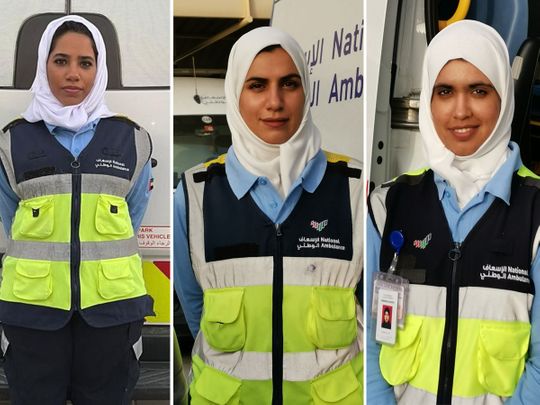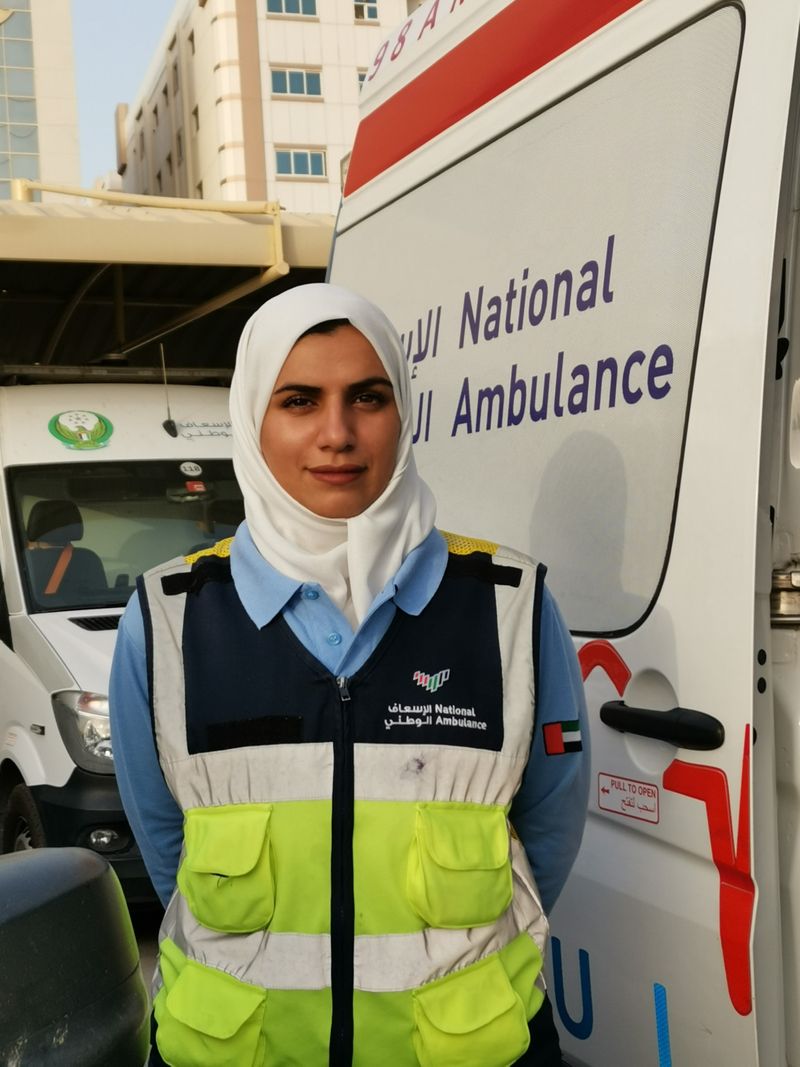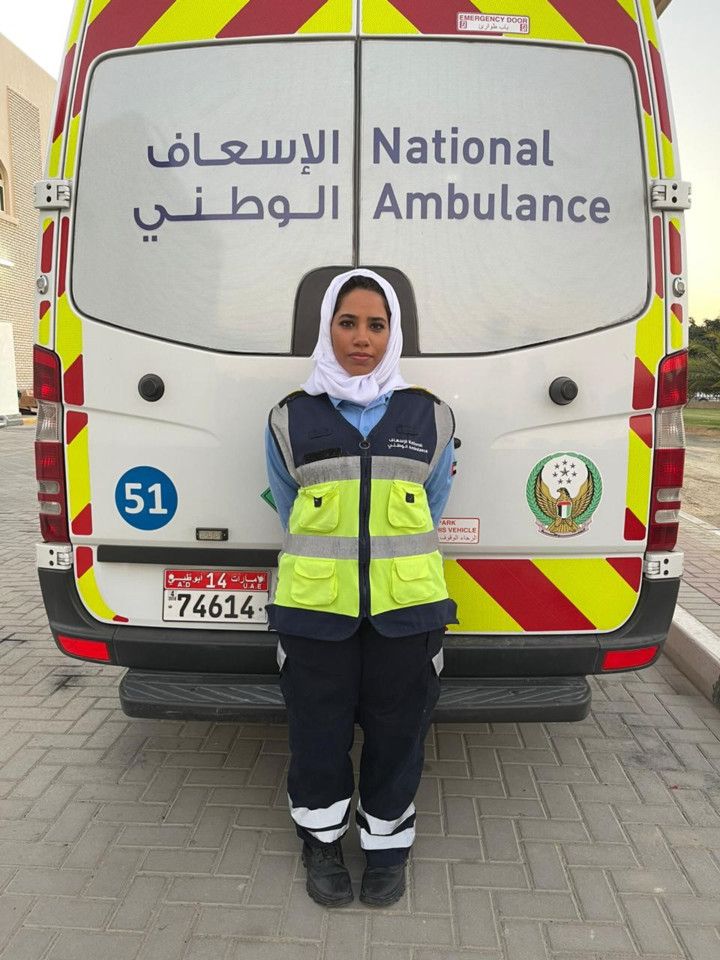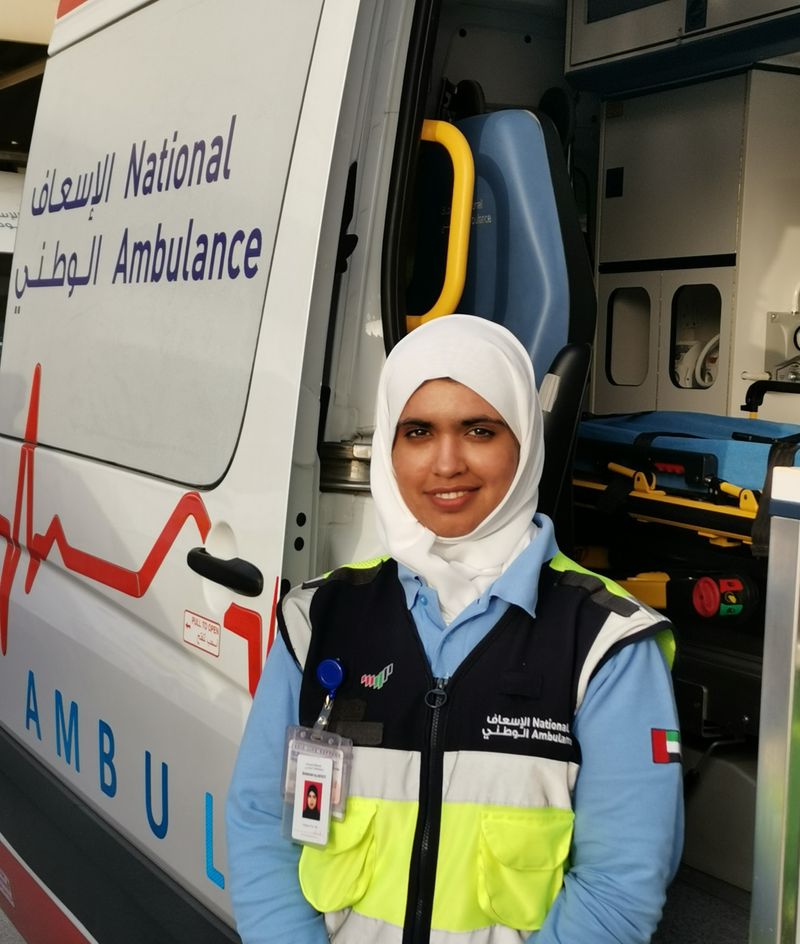
Sharjah: Emirati women have been trailblazers in the region, breaking social taboos regarding women’s roles in the community. Emirati women paramedics, who are at the frontline of emergency medical care, spoke to Gulf News about the tough emotional challenges their jobs pose.
For 30 brave UAE national women who joined National Ambulance over the last three years the opportunity was too good to pass by. Earlier this month, another 23 more Emirati females officially joined the service after successfully completing an intensive full time programme in which they gained the required theoretical knowledge and practical experience to take up a full-time position as Emergency Medical Technicians (EMT) with National Ambulance. Emirati women EMTs continue to outnumber their male counterparts accounting for almost 85 per cent of Emirati EMTs at National Ambulance.
Currently, more than 60 ambulance vehicles patrol the roads of the Northern Emirates, 24 hours a day, responding to emergency calls, providing high standards of emergency pre-hospital care. Their primary task is to provide immediate response and appropriate support on scene in the incidence of illness, injury, accidents, major incidents and public health crisis to citizens, residents and visitors across the emirates of Sharjah, Ajman, Umm Al Quwain, Ras Al-Khaimah and Fujairah.
National Ambulance's Emirati Emergency Medical Technicians (EMT) told Gulf News that their passion to help others and give back to their communities were the main driving force behind their decision to join National Ambulance. They also expressed their hope to become a positive role model to inspire other women to join them in serving the nation.
The women Gulf News spoke to said being part of an emergency crew is challenging, but, with time, they managed to overcome the difficulties and learned how to cope with them. One said: “The hardest point in the job is responding to an incident that involves children, who either passed away, were severely injured or abused. However, they all expressed that nothing is more rewarding and satisfying than saving someone’s life or helping someone in their moment of need.
They also agreed that more Emirati women needed to be encouraged to become Emergency Medical Technicians, especially during this vital time where there is more demand than ever on clinical services. One told us: “We do need more Emirati women in this field. Being an EMT gives us a sense of national pride as we are able to serve the community and give back to our country.”
Gulf News interviewed EMTs Ohoud Al Serkal, Woraija Al Ketbi and Shaikha Alhefeiti and asked them about their achievements and challenges.
GULF NEWS: How was the experience as a UAE national woman member at National Ambulance, specifically in the emergency profession?
Answers: Ohoud Al Serkal: Joining National Ambulance has given us the chance to do something meaningful and give back to our country by offering us the opportunity to become qualified emergency medical paramedics who are able to serve on the frontline.
Woraija Al Ketbi: Working in the EMT profession is a very unique and interesting experience for women. It has its challenges and sometimes can be tiring and stressful, however, this profession is meant for compassionate people who thrive by helping others.

Shaikha Alhefeiti: Within a short period of being in this profession, we learned how to deal with the challenges and overcome the obstacles, and the more incidents you respond to, you become more resilient as you gain more strength and self-confidence and become more skilful and fit. They also expressed pride in representing their country and in dealing with a lot of people from many different nationalities.
Question: What challenges and difficulties have you faced so far?

For Ohoud Al Serkal, the main challenge always is to stay focused on saving the lives of a patient despite all obstacles whether it was the severity of their case or having to deal with a panicking family member who want you to do all you can to save their loved one. For Shaikhah Alhefeiti, the sight of dead children is very difficult. It is extremely tough when we see or experience such situations. It is very painful to see a child in a critical condition or see his or her family members in pain.
Meanwhile, for Woraija Al Ketbi, the language component is sometimes a challenge facing us while doing our job. There are some nationalities that are difficult to deal with because of the language factor — such as Hindi, Russian, German and French. Also the difficulty of making balance between working day and night, the change in sleeping hours due to working in shifts was difficult at first, but she said they had overcome it.
Question: Do you have the desire to complete the journey, or would you prefer another career that is quieter and less demanding of physical and emotional effort?
Shaikhah Alhefeiti: We never want to leave this profession. Ohoud Al Serkal: We have ambitions and we want to develop ourselves in the field of emergency medical services (EMS).
Question: Have you succeeded in creating a balance between your career and your commitments as a wife, mother or family member?
Woraija Al Ketbi: For first responders, staying at home isn’t an option during the COVID-19 pandemic and when you return home after a shift, you want to ensure that your loved ones are protected from COVID-19. Ohoud said We are lucky because we get the support from our parents. They are proud of us and for what are doing. The UAE leadership’s support has been invaluable and the fact that we are now considered ‘frontline heroes’ really helped in getting more and more support from the community and family members. Despite all the challenges, with the support we get from our families and communities and the satisfaction we get from serving others we have succeeded in creating a balance between work and family life.
Question: Any word of advise for women who want to join this profession?
Woraija Al Ketbi: You should be a strong, independent, physically fit, patient and willing to dedicate your life to this career.
Question: Tell us about the most memorable cases that you have responded to since you joined the service.
Woraija Al Ketbi: I was an oral and dental health specialist but decided to switch careers by becoming an EMT. I remember one of the cases we responded to was a patient who had a severe head injury and a shoulder dislocation. He seemed very terrified, as he was a person of determination and had difficulty in communication. I was among the staff who responded to the case, and because I had previous experience in sign language, I was able to calm him down until he was taken to the hospital. Despite his pain, he was happy in the presence of emergency crew who were able to communicate with him in sign language. This situation made me feel proud that I was able to provide assistance and I would never forget the smile on the patient’s face.
Shaikhah Alhefeiti has graduated from the United Arab Emirates University in Molecular Biology and worked as a teaching assistant at the same university before joining National Ambulance as an EMT. She said: “I will never forget the day we responded to a little boy who fell from the 11th floor of a building.

"He had several fractures and he went into a traumatic cardiac arrest. It was my first time to deal with this and I was anxious and worried over the silent mother who was in shock sitting next to her son. It was painful seeing her in that situation. So I had to control my emotions and start helping my colleague to resuscitate the little boy and give proper management. We did our best and moved him to hospital for further treatment, but unfortunately he passed away. Working with patients in the paediatric department is the most difficult no matter how much experience we have.”
Ohoud Al Serkal, an Emergency Medical Technician, said: “Our career is actually a life-saving job and focused on serving humanity, we get unique cases everyday but the greatest satisfaction we feel is when we save a life. It is a great feeling! I have witnessed many strange cases, but the worst was the abuse to a one-month-old girl by her father. I could not forget the sight of the baby. Especially as a mother myself, it was hard. We go through a lot of emotional stress, but we can’t show them in front of the patients’ families. I was relieved when we were able to give the baby the medical assistance needed and when we came to know that she had been granted the required intervention from family protection services.”








